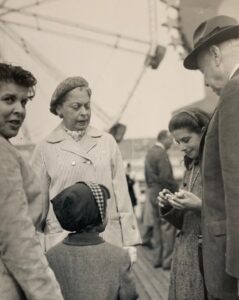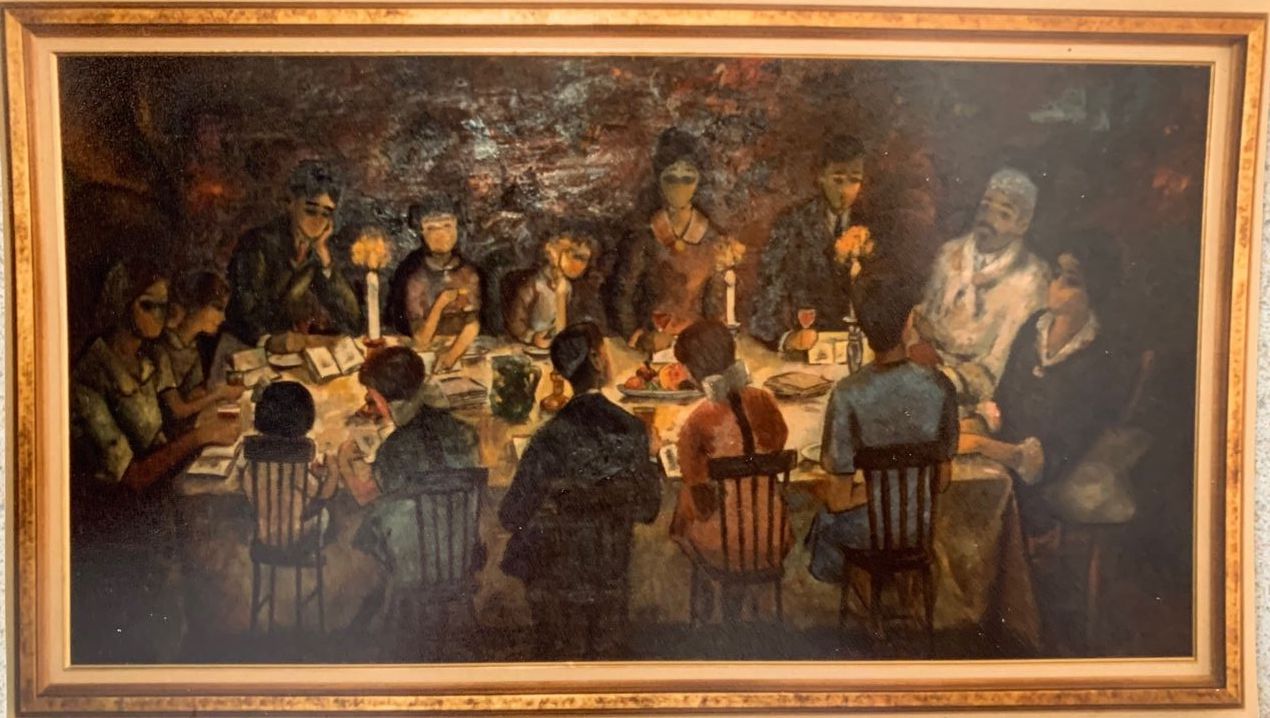Family Seder Memories
Painting by my great uncle Paul Hausdorff.
The Passover Seder was a big event in Dad’s paternal family. Some of my earliest memories are from these get-togethers. After all these years, now that so many relatives have passed, these Seder remembrances are precious.
My earliest Seder memories begin at Mrs. Fox’s Hotel in Atlantic City, New Jersey. This establishment was a small, weather-beaten, clapboard building. While I don’t remember the Seders at Mrs. Fox’s, I do recall learning how to walk down steps like a “big girl.” One of Dad’s first cousins or maybe one of The Aunties – my father’s very regal aunts – taught me how to put one foot down on a step and then the next foot down on the step below.
And there was a cousin with a collie? And maybe my sisters got the game of Monopoly as an afikomen present? Alas, I’m not sure these memories are accurate or from another family get-together.
A few years later, our family Seder moved to Asbury Park, New Jersey. A woman named Mrs. Weiss ran a kosher hotel there, another large clapboard building. I think it was green. She was Hungarian, and Dad loved her spicy cooking. (We went back for summer vacations since the food was so good.)
We would arrive on Erev Passover, sometime after lunch. I remember noshing on Passover kichel (egg cookies) and mondels (puffed matzah meal croutons) in the car on the drive. There wasn’t much else we could eat since we couldn’t eat bread. After checking in and unpacking, it was time for a stroll on the boardwalk. I distinctly recall the delicious aroma of roasting peanuts coming from the Mr. Peanut shop. Outside the store an employee gave out free samples. However, since peanuts cannot be eaten on Passover, we always had to say “no, thank you.” I have a photo of my sisters and me on that boardwalk with Great-Aunt Harriet (she owned a mink coat!).

The Seder began, as usual, at night. Grandpa Joe (Dad’s father) sat regally at the head of our table in the large dining room. The hotel always hired a chazan (cantor) to lead the Seder, but Grandpa did his own thing. Being of German descent, his way was the correct way. After the meal, with half of the Haggadah to go, the chazan would speed up. After all, it was late, and the kitchen staff wanted to clean and set up for breakfast. Grandpa, of course, ignored the chazan. Subsequently, we were always the last ones to leave the dining room.
Another memory of that time is begging my mother to let me go to bed! She was adamant that I had to stay at the table until the very end. It wasn’t a religious thing, not at all. If I went to bed, she would have to stay with me, as I was too young to be left alone in a hotel room.
At some point, these extended family Seders ceased. Perhaps it was too difficult for the relatives to travel – most were from New York and weren’t young. Our Seders then moved to Baltimore, with my mother doing most of the work.
My parents hosted. Their house wasn’t spacious, just three bedrooms, one den with a sleep sofa, two full baths and a half-bath. Grandpa Joe and Grandma Jean must have slept over because they didn’t drive on the holiday. So where did my sisters sleep? I cannot remember; I didn’t have to give up my bedroom. Grandpa Nathan, Mom’s dad from South Dakota, also came, usually for a two-to-three week visit. How did all of us fit into that house?
The kitchen was tiny, and Mom did not want us under her feet when preparing meals. Grandma Jean, her mother-in-law, was definitely not welcome in Mom’s space. My sisters and I were the clean-up crew, however. We washed dishes and sang songs in three-part harmony.
For many years, Grandpa Joe led these Seders; again, everything had to be done his way to a tee. When he was no longer able to conduct the service, Dad took over. Now Grandpa Joe sat at the other end of the table, opposite Dad.
For the first years of married life, my husband and I switched back and forth between families for Passover, one year with his parents and the next with mine. I don’t remember what year but eventually the Seder moved to our house. Mom and I split the cooking. My mother-in-law, a fabulous cook, was always eager to contribute her delicious recipes if she and my father-in-law were coming.
By this time, Mom’s brother, Uncle George, who lived in Rock Island, Illinois, drove in for the Seders. It was an opportunity to see his father, Grandpa Nathan, and spend time with the family. Grandpa, Uncle George, my sister Margo and her family of four slept at my parents’ house. Somehow, we squeezed up to 19 people into our dining room for meals.
Us “kids” liked to relax and be silly at the Seder—where appropriate—especially after lots of wine. Dad, like Grandpa Joe before him, was a stickler for getting through the entire Haggadah. Unlike Grandpa Joe, he was fast! When someone got silly or told a story or took too much time explaining a passage in the Haggadah, he’d start tapping on his watch. That was the sign to hurry up!
My mother’s last Passover was sad but special. A few weeks prior to the holiday, she admitted that making Passover was too daunting for her; she was fighting cancer. Her suggestion was to go to a hotel, and she and Dad would pay! They made reservations at Wisp, a ski resort in Western Maryland.
Despite Mom’s illness and Dad’s confusion (due to dementia) it was a wonderful eight days. The hotel gave us a private room for the Seders since we were a group of 18. The Israeli chef and Russian wait staff were amazing. Every meal was better than the one before. During the week we swam, went boating on Deep Creek Lake and ate 24/7. Despite some pouting by our moody teenage kids, a good time was had by all.
Mom died October of that year, and the Seders have never been the same. We went to hotels two times—once to Virginia Beach and another time to Fort Lauderdale. Mom was missed. Then, my sister Laura died four years after Mom. Margo and her family decided to go to a resort in Arizona, taking Dad with them. Sadly, the family was split.
As heartbreaking as this story is, I know this. Grandpa Joe’s legacy is the importance of family celebrating the Seders together. This was ingrained into him as a child.
He was one of 12 siblings. An oil painting done by his brother Paul, an artist, depicts the family Seders of their youth. Gathered around the table are his parents, my great-grandparents and all 12 of their children. I have a photograph of the painting. Dad received it from his cousin Dorie. The original painting hung in her house for many years. Now, it hangs in her daughter’s home in Silver Spring. One day I hope to see it in person.
Uncle Paul also designed and illustrated a Haggadah dedicated to my great-grandmother, Laura. (Great-grandfather Heinrich/Henry, died when Paul was young). Three-quarters of a century later, in October 1997, 16 copies were reproduced for members of the descendant families. I proudly inherited a copy from Dad. Our traditions continue…
Read more by Eileen Creeger.


Live this, both the memories that I can remember and the ones I’m hearing for the first time ❤️
This article is beautifully and warmly written, I feel like I was there! May you and Ken be blessed with many opportunities to make and share memories with your wonderful family until 120!
Full transparency: Eileen Creeger and I are second cousins who began emailing each other just a couple of years ago. In fact, we only met in person in 2019. My grandmother Sarah and her grandfather Joe were siblings one and two in the family of 12. I have a copy of Uncle Paul’s Haggadah also! I had a smile on my face reading this, recognizing the Germanic trait of “this is how we do it” that Grandpa Joe insisted on as he led the Seder. My Uncle Henry, Sarah’s son, led our Seder during my childhood and it was the same insistence on inherited songs. Fast? No way. Especially the second half of the Seder when everyone is full from dinner. At our Seder, we slow down to sing, and everyone is awake for the final onslaught of harmonized, table-pounding singing. What beautiful memories, Eileen. Bitter-sweet as life is, but so full of love.
Thank you, Dedi! Next year in Yerushalayim.
What a lovely thing that you and your cousin connected and now share memories!